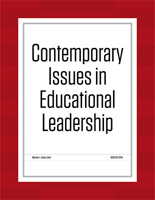Educational Administration, Department of

Contemporary Issues in Educational Leadership
Date of this Version
11-21-2017
Document Type
Article
Citation
Contemporary Issues in Educational Leadership, 2:3 (2017) ISSN 2472-9744 ; http://digitalcommons.unl.edu/ciel/
doi: 10.13014/K2Q81B8F
Abstract
Only 8 of the 1,247 public school districts served by the Texas Education Agency are headed by African American female superintendents. In order for African American women to be considered for the superintendency in Texas, they must understand the barriers marked by intersectional misconceptions.
The narrative methodology focuses on accounts derived from experiences expressed in a form of storytelling. This correlates the conceptual framework with the variables of critical race theory (CRT), glass ceiling theory, and generational theory. This process was vital to understanding generational differences of African American women on the journey to the superintendency. This research focused on 22 African American women who were completing requirements for the superintendency, assigned to two separate groups for two methods of data collection. Through snowball sampling, six women were interviewed face to face. Through stratified sampling, 22 women completed an online survey consisting of open-ended questions. Research questions were developed from an exploratory question: In what ways does generation membership impact African American women’ leadership development? This research addressed five research questions regarding the differences in experiences of aspiring African American female superintendents related generational membership regarding racism, career mentorship, leadership, motivation to aspire to the position, and the work environment with other African American women in other generations. The research produced five emergent themes: (a) Racial Awareness: Legal Blinders, (b) African American Women Role Models: The Matriarch, (c) Diverse Leadership Styles: Mindset Shift, (d) Career Perspective: Change x Confidence, and (e) Guidance: Professional Expression. Five subthemes emerged: (a) Diverse Teaching Experience: Partition, (b) Early Leadership Development: School Favored, (c) Diverse Mentors: We Are Both American, (d) Awareness of Intersectionality: Sexism and Ageism, and (e) Admiration: Paying Respect. Although African American women reported similarities in their experiences, the differences across generational memberships were affected by societal influence on the African American community within education. This study supports the need for preparation of young African American women in future generations to enter the field of education with the skills necessary for advancement in educational leadership.


Comments
Copyright © 2017 Patrice L. Allen & Joshua D. Hughes